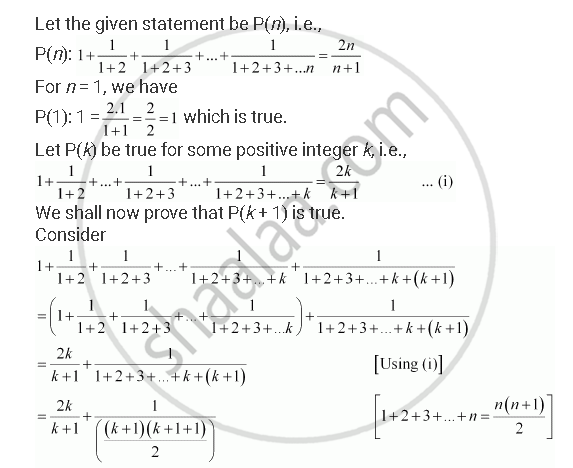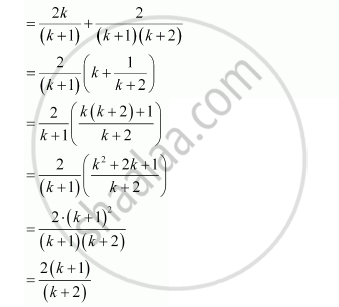Advertisements
Advertisements
प्रश्न
Prove the following by using the principle of mathematical induction for all n ∈ N:
उत्तर


Thus, P(k + 1) is true whenever P(k) is true.
Hence, by the principle of mathematical induction, statement P(n) is true for all natural numbers i.e., n.
APPEARS IN
संबंधित प्रश्न
Prove the following by using the principle of mathematical induction for all n ∈ N: 1.2.3 + 2.3.4 + … + n(n + 1) (n + 2) = `(n(n+1)(n+2)(n+3))/(4(n+3))`
Prove the following by using the principle of mathematical induction for all n ∈ N:
`(1+ 1/1)(1+ 1/2)(1+ 1/3)...(1+ 1/n) = (n + 1)`
Prove the following by using the principle of mathematical induction for all n ∈ N:
Prove the following by using the principle of mathematical induction for all n ∈ N: `1+2+ 3+...+n<1/8(2n +1)^2`
Prove the following by using the principle of mathematical induction for all n ∈ N: n (n + 1) (n + 5) is a multiple of 3.
Prove the following by using the principle of mathematical induction for all n ∈ N: 102n – 1 + 1 is divisible by 11
Prove the following by using the principle of mathematical induction for all n ∈ N (2n +7) < (n + 3)2
If P (n) is the statement "2n ≥ 3n" and if P (r) is true, prove that P (r + 1) is true.
1 + 3 + 5 + ... + (2n − 1) = n2 i.e., the sum of first n odd natural numbers is n2.
\[\frac{1}{2 . 5} + \frac{1}{5 . 8} + \frac{1}{8 . 11} + . . . + \frac{1}{(3n - 1)(3n + 2)} = \frac{n}{6n + 4}\]
1.3 + 3.5 + 5.7 + ... + (2n − 1) (2n + 1) =\[\frac{n(4 n^2 + 6n - 1)}{3}\]
32n+2 −8n − 9 is divisible by 8 for all n ∈ N.
n(n + 1) (n + 5) is a multiple of 3 for all n ∈ N.
Given \[a_1 = \frac{1}{2}\left( a_0 + \frac{A}{a_0} \right), a_2 = \frac{1}{2}\left( a_1 + \frac{A}{a_1} \right) \text{ and } a_{n + 1} = \frac{1}{2}\left( a_n + \frac{A}{a_n} \right)\] for n ≥ 2, where a > 0, A > 0.
Prove that \[\frac{a_n - \sqrt{A}}{a_n + \sqrt{A}} = \left( \frac{a_1 - \sqrt{A}}{a_1 + \sqrt{A}} \right) 2^{n - 1}\]
Let P(n) be the statement : 2n ≥ 3n. If P(r) is true, show that P(r + 1) is true. Do you conclude that P(n) is true for all n ∈ N?
x2n−1 + y2n−1 is divisible by x + y for all n ∈ N.
Prove by method of induction, for all n ∈ N:
1.3 + 3.5 + 5.7 + ..... to n terms = `"n"/3(4"n"^2 + 6"n" - 1)`
Prove by method of induction, for all n ∈ N:
`1/(1.3) + 1/(3.5) + 1/(5.7) + ... + 1/((2"n" - 1)(2"n" + 1)) = "n"/(2"n" + 1)`
Prove by method of induction, for all n ∈ N:
(24n−1) is divisible by 15
Prove by method of induction, for all n ∈ N:
5 + 52 + 53 + .... + 5n = `5/4(5^"n" - 1)`
Prove by method of induction, for all n ∈ N:
`[(1, 2),(0, 1)]^"n" = [(1, 2"n"),(0, 1)]` ∀ n ∈ N
Answer the following:
Prove, by method of induction, for all n ∈ N
12 + 42 + 72 + ... + (3n − 2)2 = `"n"/2 (6"n"^2 - 3"n" - 1)`
Answer the following:
Given that tn+1 = 5tn − 8, t1 = 3, prove by method of induction that tn = 5n−1 + 2
Answer the following:
Prove by method of induction 152n–1 + 1 is divisible by 16, for all n ∈ N.
Define the sequence a1, a2, a3 ... as follows:
a1 = 2, an = 5 an–1, for all natural numbers n ≥ 2.
Use the Principle of Mathematical Induction to show that the terms of the sequence satisfy the formula an = 2.5n–1 for all natural numbers.
Show by the Principle of Mathematical Induction that the sum Sn of the n term of the series 12 + 2 × 22 + 32 + 2 × 42 + 52 + 2 × 62 ... is given by
Sn = `{{:((n(n + 1)^2)/2",", "if n is even"),((n^2(n + 1))/2",", "if n is odd"):}`
State whether the following proof (by mathematical induction) is true or false for the statement.
P(n): 12 + 22 + ... + n2 = `(n(n + 1) (2n + 1))/6`
Proof By the Principle of Mathematical induction, P(n) is true for n = 1,
12 = 1 = `(1(1 + 1)(2*1 + 1))/6`. Again for some k ≥ 1, k2 = `(k(k + 1)(2k + 1))/6`. Now we prove that
(k + 1)2 = `((k + 1)((k + 1) + 1)(2(k + 1) + 1))/6`
Prove the statement by using the Principle of Mathematical Induction:
For any natural number n, 7n – 2n is divisible by 5.
Prove the statement by using the Principle of Mathematical Induction:
For any natural number n, xn – yn is divisible by x – y, where x and y are any integers with x ≠ y.
Prove the statement by using the Principle of Mathematical Induction:
n2 < 2n for all natural numbers n ≥ 5.
A sequence a1, a2, a3 ... is defined by letting a1 = 3 and ak = 7ak – 1 for all natural numbers k ≥ 2. Show that an = 3.7n–1 for all natural numbers.
Prove that, sinθ + sin2θ + sin3θ + ... + sinnθ = `((sin ntheta)/2 sin ((n + 1))/2 theta)/(sin theta/2)`, for all n ∈ N.
If xn – 1 is divisible by x – k, then the least positive integral value of k is ______.
Consider the statement: “P(n) : n2 – n + 41 is prime." Then which one of the following is true?
